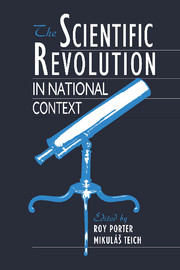Book contents
- Frontmatter
- Contents
- Notes on contributors
- Acknowledgements
- Introduction
- 1 Scientific Revolution, social bricolage, and etiquette
- 2 The Scientific Revolution in France
- 3 The Scientific Revolution in the German Nations
- 4 The new philosophy in the Low Countries
- 5 The Scientific Revolution in Poland
- 6 The Scientific Revolution in Spain and Portugal
- 7 The Scientific Revolution in England
- 8 The Scientific Revolution in Bohemia
- 9 Instituting science in Sweden
- 10 The Scientific Revolution in Scotland
- Index
1 - Scientific Revolution, social bricolage, and etiquette
Published online by Cambridge University Press: 05 June 2012
- Frontmatter
- Contents
- Notes on contributors
- Acknowledgements
- Introduction
- 1 Scientific Revolution, social bricolage, and etiquette
- 2 The Scientific Revolution in France
- 3 The Scientific Revolution in the German Nations
- 4 The new philosophy in the Low Countries
- 5 The Scientific Revolution in Poland
- 6 The Scientific Revolution in Spain and Portugal
- 7 The Scientific Revolution in England
- 8 The Scientific Revolution in Bohemia
- 9 Instituting science in Sweden
- 10 The Scientific Revolution in Scotland
- Index
Summary
early modern Italian science has received and continues to receive so much attention that no summary or synopsis could do justice to the available historiography. Therefore, this essay does not try to offer a synthetic picture of the development of the various scientific disciplines in Italy between 1500 and 1700. Instead, taking the title of this book seriously, I will try to locate some of the conditions that framed the development and subsequent crisis of Italian science during the Scientific Revolution. Some comparison of the cultural and political contexts of Italy and other European countries will help identify possible connections between different national contexts and different aspects or phases of the Scientific Revolution. The essay concludes by suggesting a range of homologies between the development of scientific discourse, authorship and institutionalization during the Scientific Revolution and what Norbert Elias has called the ‘civilizing process’ – the development of court society, political absolutism and the modern state.
DECLINE OR MARGINALIZ ATION?
For some time, the crisis of Italian science after Galileo's death was conveniently explained away by the religious obscurantism that was claimed to have set in after his trial in 1633. The attribution of such a central causal role to the trial reflects a tendency in the older historiography to turn Galileo's career (with its brilliant start and abrupt ending) into the epitome of Italian modern national science.
- Type
- Chapter
- Information
- The Scientific Revolution in National Context , pp. 11 - 54Publisher: Cambridge University PressPrint publication year: 1992
- 26
- Cited by

